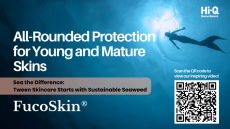Au naturale? ‘Natural’ tops online 2019 beauty claims but consumer interest wanes, says Euromonitor

Findings from Euromonitor International’s AI-powered product claims and positioning system that tracked and extracted e-commerce data from 1,500 retailers worldwide, revealed the top product claims made across the entire online fast-moving consumer goods (FMCG) category in 2019. For beauty and personal care, ‘natural’ was the top claim, made across 3.3% of total online SKUs (more than 700,000); just ahead of ‘hydrating’ made across 3.2% and ‘no parabens’ made across 2.8%. These three top claims featured across more than 21.5 million online beauty and personal care SKUs worldwide.
‘Antioxidant’ and ‘organic’ claims came in fourth and fifth, each made across 1.7% of total online beauty and personal care SKUs.
A ‘natural’ beauty boom?
Gabriella Beckwith, senior analyst for beauty and fashion at Euromonitor International, said ‘natural’ had topped the beauty and personal care charts because of an industry-driven market shift, particularly from independent brands.
“‘Natural’ has been driven to the top as consumers were exposed to a more independent narrative and a wider product assortment that was no longer controlled by the leading incumbent companies,” Beckwith told CosmeticsDesign-Europe.
In recent years, she said there had been “a huge wave of natural beauty brands entering the market”, and these brands had infiltrated all parts of the beauty and personal care category, including staples like oral care and deodorants.
“This, in combination with consumers aspiring to maintain healthier lifestyles and becoming more knowledgeable about ingredients, has driven the growth of ‘natural’,” she said.
But… is there growing interest in ‘natural beauty’?
However, Beckwith said the top 2019 online beauty claim didn’t necessarily hold most consumer interest.
“Consumer interest in natural products is slowly waning, as lack of certification standardisation and the realisation that natural is not necessarily always best for efficacy or for the environment is having a knock-on effect.”
According to Euromonitor International's annual Lifestyles Survey - conducted across 40 countries with 40,000 respondents in January/February 2020 - just 50.5% of global consumers considered 'natural' a trustworthy label descriptor - down from 55.5% in 2017.
Consumers, Beckwith said, had started to recognise that natural ingredients didn’t necessarily translate as better and so demand for ‘green’ or ‘clean’ beauty and personal care products had shifted towards ‘conscious’.
“Consumers are now prioritising credentials such as safety, transparency and ethical sourcing,” Beckwith said. And this view took a “more targeted and personalised approach and understanding of skin type, rather than dismissing entire ingredient groups”, she said.
‘Eco’ and ‘ethical’ 2020 beauty claims to watch
Beckwith said that as COVID-19 had exacerbated consumer shifts in mindsets and priorities, the “eco and ethical conscience” had risen in importance, with subsequent expectations on brands.
“While health and hygiene take priority over eco-initiatives during COVID-19, an environmental focus will resume post-crisis, driving demand for eco-conscious products. With the beauty industry being pressed to find solutions to the industry’s overconsumption of plastic and water, and speed up eco and clean innovations, we can expect to see environmentally friendly claims rise up the ranks.”
The ongoing COVID-19 crisis had also raised demand for ‘safe’ beauty, Beckwith said, with safety, provenance, sustainability and transparency of ingredients “even more sought after”.
“Therefore, product claims with a strong association to health, therapeutics and overall wellness can also be expected to rise up the ranks,” she said.




















